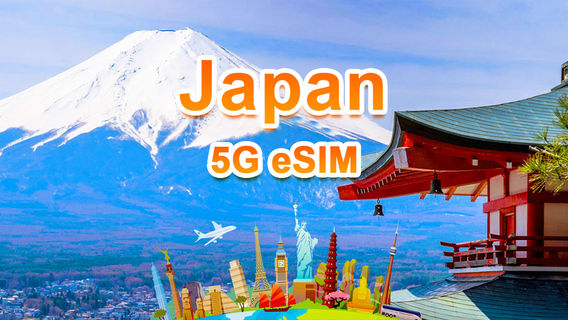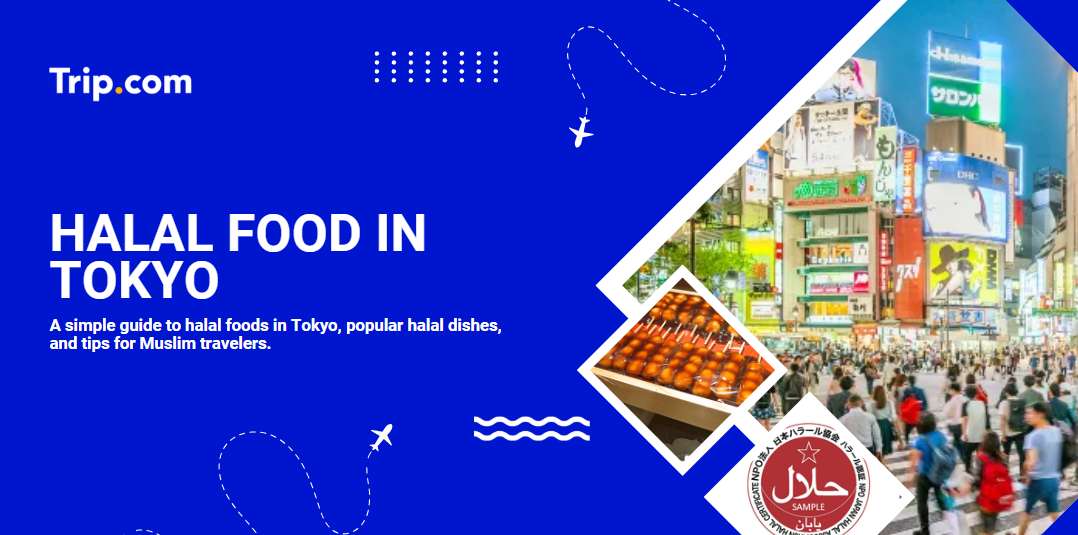
Tokyo’s food is all about fresh ingredients, careful preparation, and a deep love for tradition. Every meal feels thoughtful whether it’s a warm bowl of ramen, crispy tempura, or a simple piece of sushi. The flavors are clean and balanced, using things like soy sauce, miso, seaweed, and dashi (a type of broth) to bring out the natural taste of the food. Some dishes are light and delicate, while others are rich and filling. From quick bites at street stalls to quiet meals at small local shops, eating in Tokyo is not just about food, it’s a special part of everyday life.
About Halal Food

Halal food refers to food and drink that are permissible according to Islamic law. The word "halal" itself means "permissible" in Arabic, and it governs what Muslims are allowed to eat, drink, and consume in general. It is an important aspect of the Islamic faith, ensuring that food is prepared, handled, and consumed in a way that aligns with religious principles.
Japan, especially Tokyo, is becoming more welcoming to Muslim travelers, with a growing number of halal-friendly options available across the city. Although Japan is not a Muslim-majority country, many restaurants and shops now offer halal meals, prayer spaces, and clear labels to help Muslim visitors feel comfortable. In Tokyo, you can find halal versions of popular dishes like ramen, curry, and yakiniku. Whether you're near tourist areas like Shibuya, Asakusa, or around major train stations, enjoying tasty and fulfilling halal food in Tokyo is getting easier every year 😋
Deals & promotions collection: Get up to 8% off on hotel bookings
📱Get Connected in Japan
Japan eSIM from Rp 14,358
🙋Must-visit Attractions in Japan
Shiroi Koibito Park ticket from Rp 88,128
Jozenkei Onsen ticket from Rp 522, 728
Universal Studio Japan ticket from Rp 1.026,600
Tokyo Disneyland ticket from Rp 1,002,726
💓One-day tour in Japan
Hokkaido Asahiyama Zoo tour! Only Rp 928,409!
Mount Fuji+Arakurayama Sengen Park+Mount Fuji’s Fifth Station+Lake Kawaguchi+Lake Yamanaka+Hakone Owakudani! Only Rp 688,985!
Kiyomizudera Temple in Kyoto+Fushimi Inari Taisha Shrine+Todaiji Temple+maple leaf viewing trail! Only Rp 618,919!
Must-Try Halal Local Dish in Tokyo
1. Japanese Curry

(Source: sekai_cafe)
After visiting Sensoji Temple in Asakusa, I stopped at a small halal café nearby. The smell of curry cooking pulled me in. I ordered the halal beef curry, which came with warm rice and thick brown sauce on top. The beef was soft, and the curry was rich, slightly sweet, and just a little spicy. It was simple but really satisfying. The pickles on the side added a nice crunch.
📖 About Halal Japanese Curry
Japanese curry is a popular everyday dish in Japan. It’s thicker and milder than Indian or Thai curry and is usually served with rice. Some restaurants in Tokyo now offer halal versions, making it easier for Muslim travelers to enjoy.
👨👩👧👦 Persona Fit
Good for Muslim travelers, families, and anyone new to Japanese food.
Best Place To Try | Sekai Cafe |
Opening Hour | Friday, Saturday & eve of public holidays: 10:30 AM – 10:00 PM (last food orders by 9 PM) Sunday–Thursday: 10:30 AM – 8:00 PM (last food orders by 7 PM) |
Cost | ¥1,200–¥1,500 / Rp 120.000–Rp 150.000 |
💡 Pro Tips
💓 Ask for medium spice for a little heat.
💓 Add cheese or boiled egg for extra taste.
💓 Try the fried chicken curry if it's on the menu.
2. Ramen

(Source: thehalalfoodblog.com)
While walking through Akihabara, I came across a small ramen shop called Ayam-YA. The "halal" sign at the front made me stop. Finally, a place where I could enjoy ramen without worry. I ordered the spicy shoyu ramen. The broth was deep and flavorful, with just the right amount of spice. The chicken slices were soft and juicy, and the noodles had a nice, chewy texture. Everything worked together perfectly. It wasn’t too heavy, just filling and satisfying. Eating it in a calm corner of busy Tokyo made the moment feel even better.
📖 About Halal Ramen
Halal ramen is a version of Japan’s popular noodle soup made without pork or alcohol-based ingredients. It uses chicken or seafood broth and halal-certified toppings. It’s a great way for Muslim travelers to enjoy an iconic Japanese dish while staying true to their dietary needs.
👨👩👧👦 Persona Fit
Great for Muslim travelers, first-time visitors, families, and anyone who wants a hearty, easy meal.
Best Place To Try | Ayam-YA Okachimachi |
Opening Hour | Lunch: 11:30 – 15:00 (last order 14:30) Dinner: 17:00 – 22:00 (last order 21:30) |
Cost | ¥850 (~Rp 85.000) - ¥950 (~Rp 95.000) |
💡 Pro Tips
💓 Choose your spice level when ordering.
💓 Try the gyoza if available—they’re halal too.
💓 Go during off-peak hours for faster service.
3. Wagyu Gyukatsu
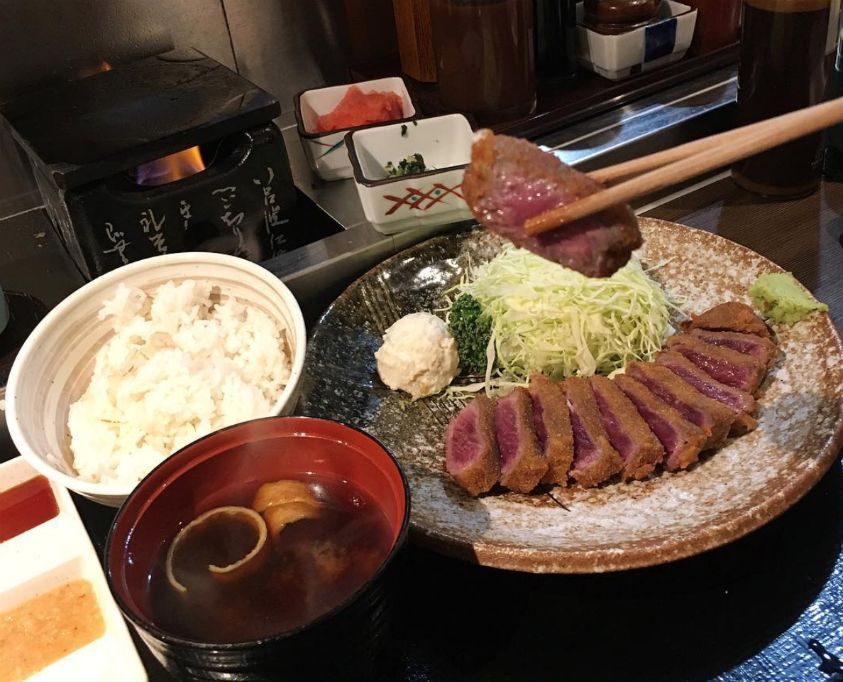
(Source: gyl.magazine.jp)
I found Gyukatsu Motomura Halal while exploring Akihabara. The restaurant was small but clean. I ordered the wagyu beef cutlet set. The beef came rare with a hot stone grill on the side, you cook each slice yourself. It was crispy outside, soft inside, and tasted great with the dipping sauces and warm rice. The miso soup and cabbage made the meal feel complete. It was simple, filling, and worth the visit.
📖 About Wagyu Gyukatsu
Gyukatsu is a breaded beef cutlet, like tonkatsu but made with beef. Wagyu gyukatsu uses high-quality beef that’s tender and flavorful. It’s not always halal, so this halal version is great for Muslim travelers in Tokyo.
👨👩👧👦 Persona Fit
Good for beef lovers, those who enjoy interactive meals, and halal diners looking for something premium.
Best Place To Try | Gyukatsu Motomura, Harajuku. |
Opening Hour | 11:00 AM – 9:30 PM |
Cost | ¥3,000–¥4,000 / Rp 300.000–400.000 |
💡 Pro Tips
💓 Cook each piece just a few seconds.
💓 Try the wasabi sauce for extra flavor.
💓 Go early to avoid long waits.
4. Sushi

I tried halal sushi for the first time at SushiKen Asakusa, just a short walk from the famous Sensoji Temple. The restaurant felt calm and traditional, with warm wooden interiors. I ordered the sushi platter, which came with a mix of tuna, salmon, prawn, and tamago (sweet egg). Each piece was fresh and perfectly shaped. The fish melted in my mouth, and the rice was seasoned just right, not too vinegary. What made it even better? Knowing everything was halal and alcohol-free. It felt like a true Japanese experience, minus the worry.
📖 About Sushi
Sushi is one of Japan’s most iconic dishes, vinegared rice paired with raw or cooked seafood, wrapped in seaweed or served as nigiri. Many sushi places use mirin or alcohol in the rice or sauces, but SushiKen Asakusa is fully halal-certified, offering a rare and safe experience for Muslim visitors.
👨👩👧👦 Persona Fit
Ideal for sushi first-timers, couples, and anyone wanting a traditional yet halal-safe Japanese meal.
Best Place To Try | SushiKen Asakusa |
Opening Hour | 11:00 AM – 3:00 PM, 5:00 PM – 10:00 PM (Closed Thursdays) |
Cost | ¥2,000–¥5,000 / Rp 200.000–500.000 |
💡 Pro Tips
💓 Try the omakase (chef’s choice) for a variety of flavors.
💓 Ask for soy sauce without alcohol (they provide halal options).
💓 Great after visiting nearby Sensoji Temple.
5. Tempura
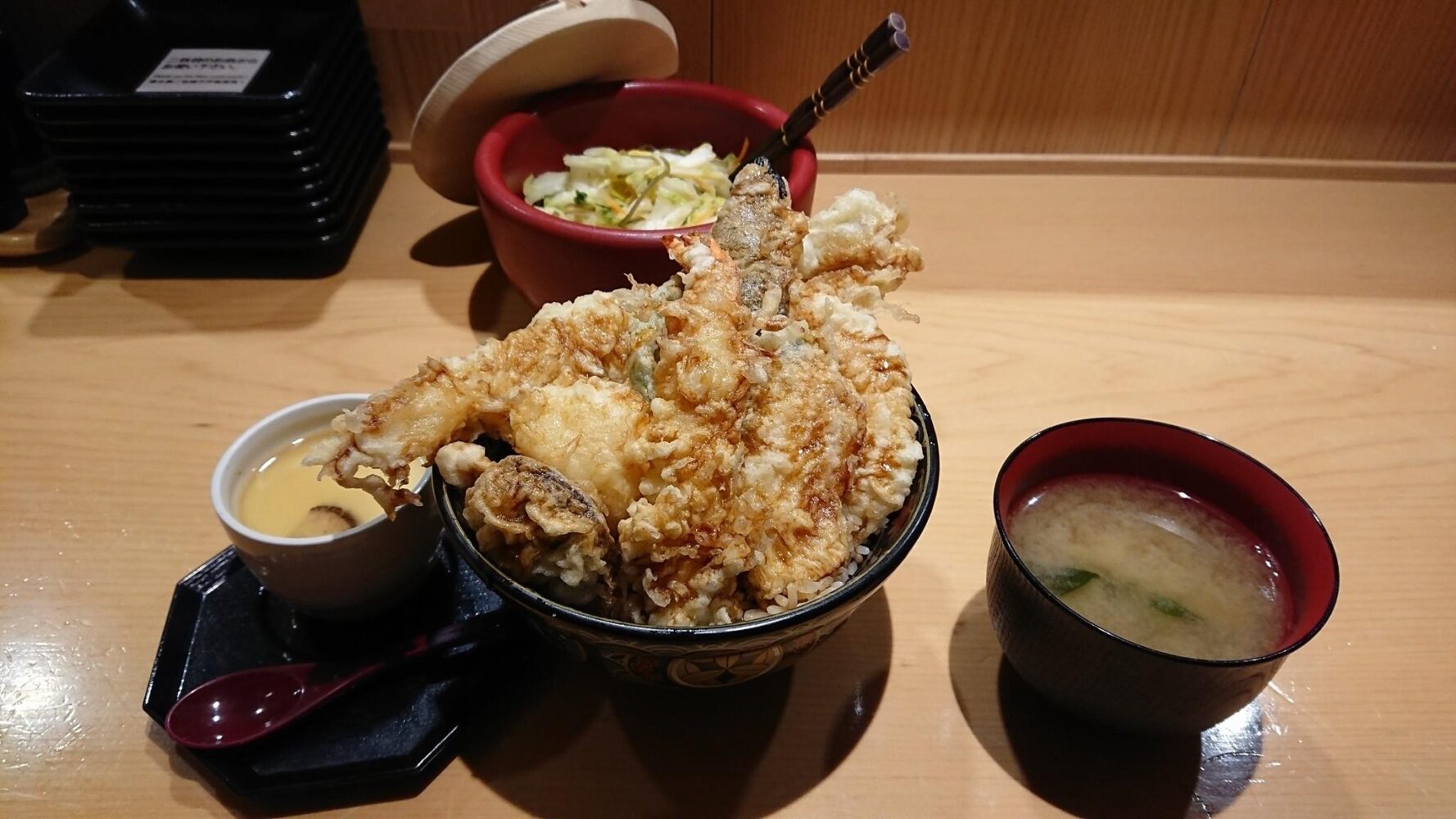
I had lunch at Tendon Itsuki Halal, located just outside Okachimachi Station. The place is small but cozy, with counter seats where you can watch the chef prepare everything fresh. I ordered their special tempura bowl—a generous serving of tempura shrimp, chicken, vegetables, and soft-boiled egg served over warm rice. The tempura was light and crispy, not greasy at all. The sweet soy-based sauce poured over the top brought everything together. It was filling, delicious, and completely halal-certified.
📖 About Tendon (Tempura Donburi)
Tendon is a popular Japanese dish made of tempura (deep-fried seafood or vegetables) served on top of rice with a savory sauce. It’s a comfort food favorite in Japan. At most places, the sauce or batter might contain alcohol or pork-based ingredients, but Tendon Itsuki Halal offers a fully halal version without compromise on taste.
👨👩👧👦 Persona Fit
Perfect for rice lovers, family-friendly, and anyone who enjoys crunchy textures and hearty meals.
Best Place To Try | Tendon Itsuki, Okachimachi, Tokyo |
Opening Hour | Mon-Fri (lunch 11am-3pm / dinner 5pm-11:15pm) Sat, Sun, Public holidays (11am-11:15pm) |
Cost | ¥1,200–¥1,800 / Rp 120.000–180.000 |
💡 Pro Tips
💓The soft-boiled egg tempura is a must-try—mix it into your rice!
💓 Go early during lunch hours, as seats are limited.
💓 You can request less sauce if you prefer it lighter.
Halal Street Food and Hawker Favorite in Tokyo
1. Takoyaki at Gindaco – A Street Snack in Asakusa
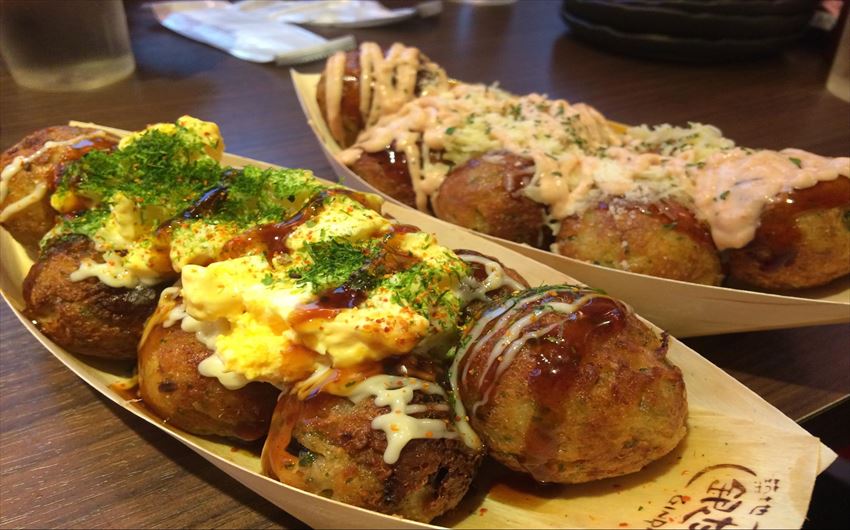
(Source: fun.jp.com)
I found a halal takoyaki stall while walking near Sensoji Temple in Asakusa. It was a small Gindaco stand with a halal-certified sign. The staff quickly made the takoyaki, pouring batter, adding octopus, and flipping the balls until they were golden brown. I ordered a small box and ate right there. The outside was crispy, the inside soft, and the octopus was tender. The sauce was sweet and savory, and they skipped the bonito flakes, making it fully halal. It was tasty, quick, and easy to eat while walking.
📖 About Gindaco Halal Takoyaki
Takoyaki is a common Japanese street snack. Usually, it includes toppings that aren’t halal. But at this Gindaco outlet, the ingredients and sauces are halal-certified, making it safe for Muslim travelers.
👨👩👧👦 Persona Fit
Good for street food lovers, Muslim travelers, and families with kids.
Basic Ingredients | Flour, baking powder, eggs, salt, pickled red ginger, octopus, tempura scraps, dried bonito flakes, green onions |
Location | Nakamise Street, near Sensoji Temple, Asakusa Station Exit 1 |
Cost | ¥500–¥700 (Rp 50.000–70.000), accepts cash or IC card |
2. Warm Taiyaki at Kurikoan Asakusa

As I walked along the shopping street in Asakusa, I came across a taiyaki stall called Kurikoan. The smell of sweet batter in the air made me stop. The taiyaki (fish-shaped cake) was cooked fresh on the iron mold, crispy on the outside and soft inside. I chose the red bean filling, which was not too sweet. Some flavors, like custard or chocolate, were also available. The taiyaki was hot and easy to eat while walking. I asked the staff, and they confirmed no alcohol or animal-based shortening was used. A nice halal-friendly snack.
📖 About Kurikoan Taiyaki
Taiyaki is a popular Japanese street snack shaped like a fish and filled with sweet paste, often red bean. Kurikoan is one of the famous chains, and while it’s not halal-certified, many Muslim travelers enjoy it because the ingredients are simple and alcohol-free. Always ask before buying.
👨👩👧👦 Persona Fit
Great for snack lovers, kids, and those wanting a quick taste of Japanese tradition.
Basic Ingredients | Cake flour, egg, sugar, condensed milk, salt, red bean paste, anko and vegetable |
Location | Nakamise Street, Asakusa – near Asakusa Station |
Cost | ¥200–¥300 (Rp 20.000–30.000), cash only |
3. Chewy Dango Snack in Asakusa
I was walking through Asakusa near Nakamise Street when I noticed a small stall selling dango—rice flour balls grilled on skewers. The smell of soy sauce caught my attention. I asked the vendor if the sauce had alcohol, and they said it was alcohol-free. I ordered one skewer of mitarashi dango. It had three chewy balls covered in a sticky, sweet soy sauce glaze. It wasn’t too sweet, and the texture was soft but slightly firm. It was a quick and warm snack I could eat while walking.
📖 About Dango
Dango is a traditional Japanese snack made of chewy rice flour balls served on a stick. The most common version, mitarashi dango, is coated in a sweet soy sauce glaze. Not all dango are halal, so it’s important to ask if the sauce contains mirin (alcohol).
👨👩👧👦 Persona Fit
Good for travelers who want a quick local snack, especially families and kids.
Basic Ingredients | Mochiko sweet rice flour, water, potato starch/katokuriko/cornstarch, sugar, sauce |
Location | Near Nakamise Street, Asakusa – close to Asakusa Station |
Cost | ¥150–¥250 (Rp 15.000–25.000) |
4. Hot Buttered Jagabata Snack
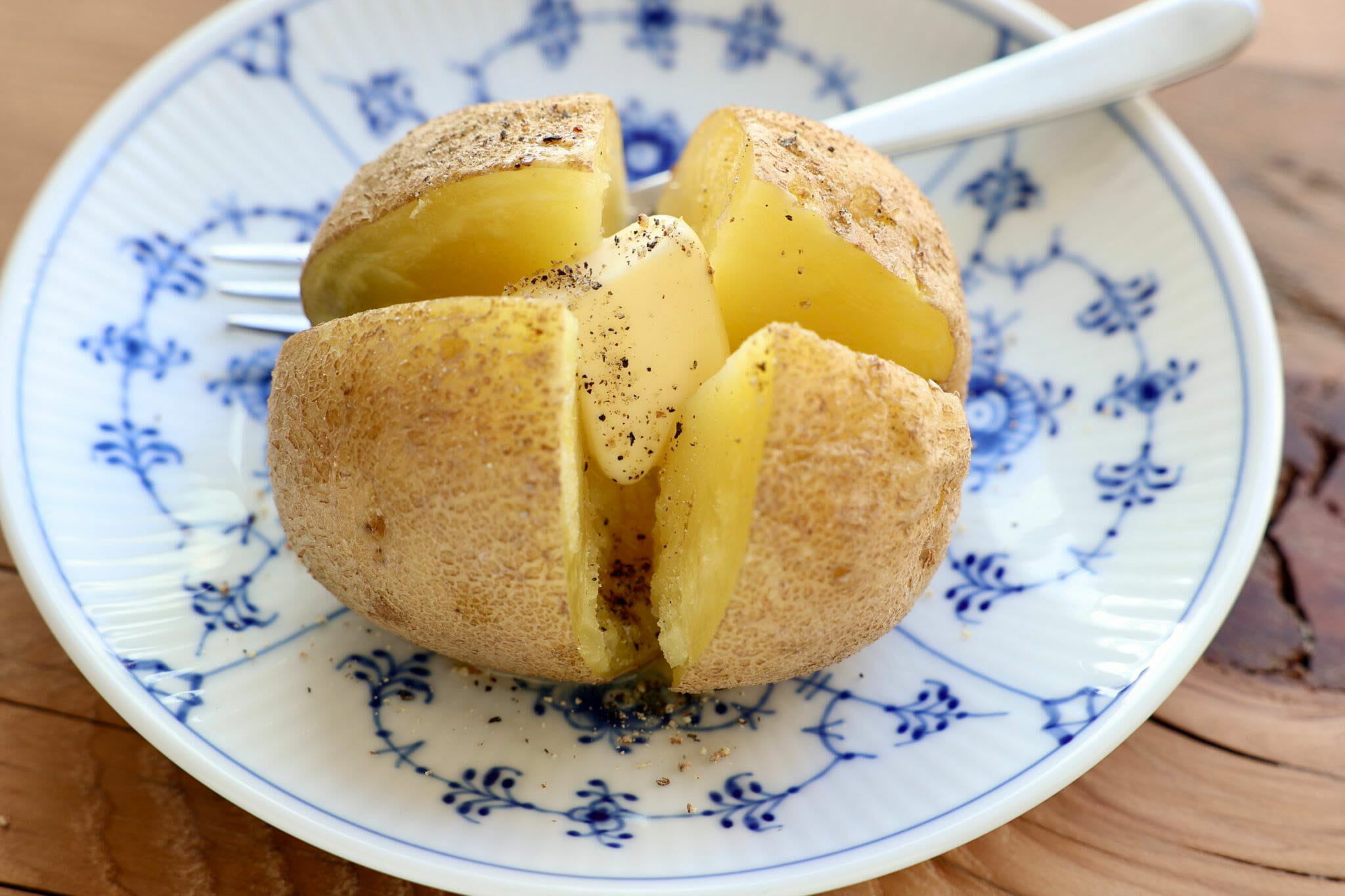
(Source: kumiko.jp.com)
I was walking around Ueno Park when I saw a small food cart selling jagabata—a steamed potato cut in half, served with butter and sometimes salt or soy sauce. The smell was warm and buttery. I ordered one and ate it with a toothpick. The potato was hot and soft, and the butter melted right into it. It was simple, warm, and filling, perfect for a quick snack while exploring the park.
📖 About Jagabata
Jagabata means “potato with butter” in Japanese. It’s a common street snack at festivals and outdoor food stalls. Some versions include toppings like corn, cheese, or soy sauce. It’s usually halal-friendly, but always check for alcohol in sauces.
👨👩👧👦 Persona Fit
Great for families, casual snackers, and anyone looking for a warm, meat-free street food.
Basic Ingredients | Steamed potato, butter, salt. |
Location | Ueno Park, near Shinobazu Pond, close to Ueno Station |
Cost | ¥300–¥400 (Rp 30.000–40.000) |
5. DIY Halal Okonomiyaki at Sometarō

(Source: paulonia.tokyo)
I went to Sometarō in Asakusa—it’s a casual place where you cook your own okonomiyaki at the table. The staff gave me a bowl with cabbage, batter, halal meat, and sauce. I poured it onto the hot grill and flipped it myself. It smelled great while cooking, and the result was crispy on the outside, soft inside. The sauce was sweet and tangy, and they confirmed it was halal-friendly. It was a fun and filling meal.
📖 About Sometarō
Sometarō is a long-time okonomiyaki spot in Asakusa. You grill the pancake yourself. They provide halal ingredients if you request, great for Muslim travelers who want to try local food safely.
👨👩👧👦 Persona Fit
Good for families, small groups, or anyone who wants a hands-on meal.
Basic Ingredients | Cabbage, flour, egg, water, halal beef or seafood, okonomiyaki sauce, mayonnaise, seaweed flakes. |
Location | 2‑20‑12 Nishiasakusa, Taito, Tokyo (5 min from Asakusa Station) |
Cost | ¥1,200–¥1,600 (Rp 120.000–160.000) |
Grab Your Tokyo Cheapest eSIM Now!
Halal Signature Restaurant and Food Institution in Tokyo
1. First-Class Halal Yakiniku at Gyumon Shibuya

(Source: gogoo-tour.com)
I visited Gyumon, a small halal yakiniku restaurant just a few minutes from Shibuya Station. The place had a cozy, simple vibe with the smell of grilled meat in the air. I ordered the Halal Wagyu Set. The beef came raw, sliced thin, and I grilled it myself at the table. The meat was soft, juicy, and full of flavor especially when dipped in their special sauce. It came with rice, salad, and soup. The staff were friendly and made sure everything was halal. It was a filling and satisfying meal, perfect after a long day exploring the city.
📖 About Gyumon
Gyumon is one of Tokyo’s first halal yakiniku spots. It’s been around since 2007 and is known for using certified A5 wagyu beef. They follow strict halal guidelines, making it a safe and tasty option for Muslim travelers.
📍 Location:
3‑14‑5 Shibuya, Shibuya‑ku, Tokyo (5 min walk from Shibuya Station)
🍴 What to Order:
Halal Wagyu Barbecue Set (beef cuts, rice, salad) – approx. ¥3,500–6,500 (Rp 350.000–650.000)
🕒 Reservation Tip:
Yes – best to reserve for dinner or weekends
👨👩👧👦 Persona Fit:
Great for halal eaters, meat lovers, and small groups.
2. Halal Sukiyaki at Diyafa Tokyo
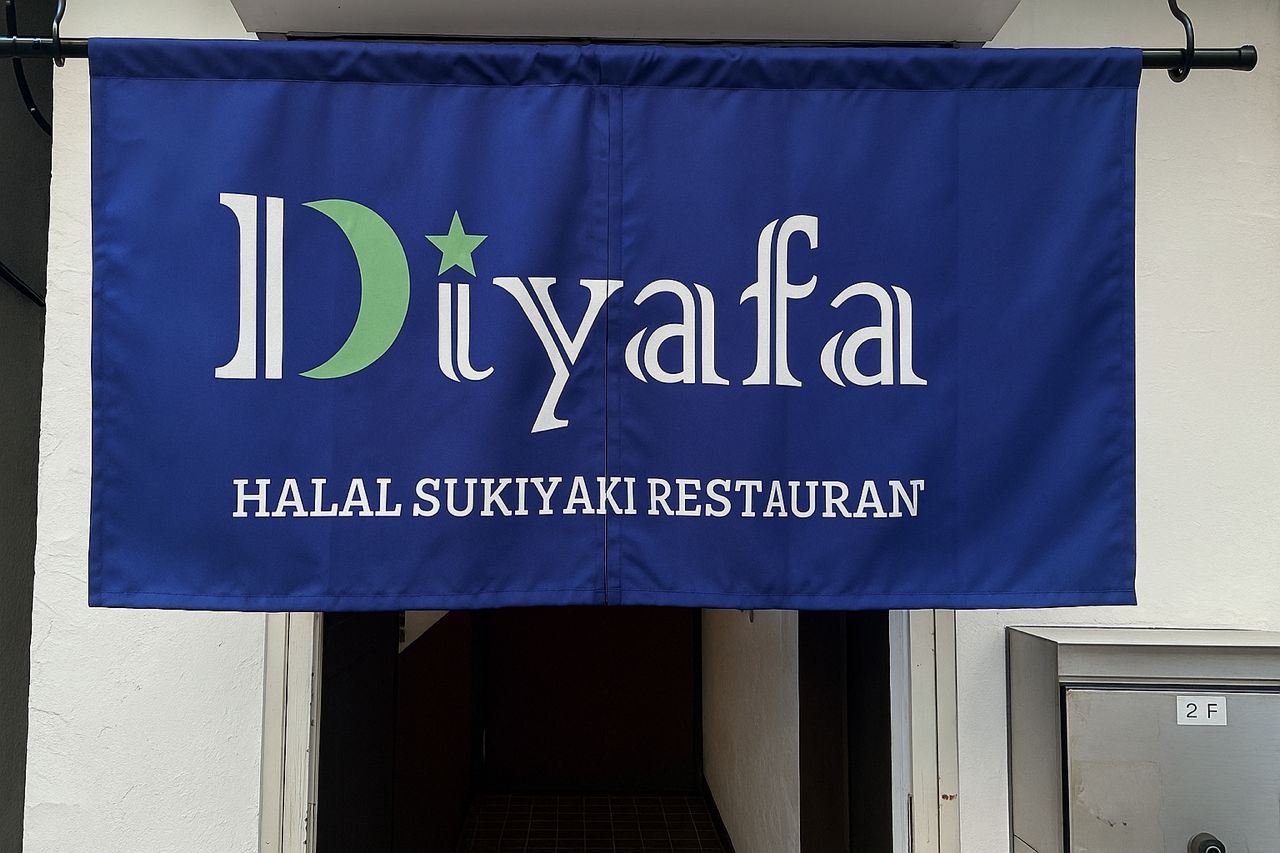
I went to Diyafa Tokyo, a quiet, well-kept halal restaurant near the city center. The place felt clean and comfortable. I ordered their halal sukiyaki set. A pot of broth came to the table along with slices of A5 wagyu beef, tofu, and vegetables. The staff explained how to dip the beef into a raw egg before eating, this made the meat softer and smoother. The flavors were rich but not too heavy. Everything was cooked fresh at the table, and the ingredients were clearly high quality. It was a simple but memorable meal.
📖 About Diyafa
Diyafa is one of the few places in Tokyo serving halal sukiyaki. It uses high-grade wagyu beef and makes the broth without alcohol or mirin, following halal standards carefully.
📍 Location:
Exact address not publicly listed, but located in central Tokyo. (Call ahead for details.)
🍴 What to Order:
Halal Wagyu Sukiyaki Set (with rice and sides) – approx. ¥3,000–¥7,000 (Rp 300.000–700.000)
🕒 Reservation Tip:
Yes – recommended for dinner, especially on weekends
👨👩👧👦 Persona Fit:
Great for halal diners, couples, and those who enjoy Japanese hotpot meals.
3. Slurping Halal Ramen at Ramen Honolu, Ebisu
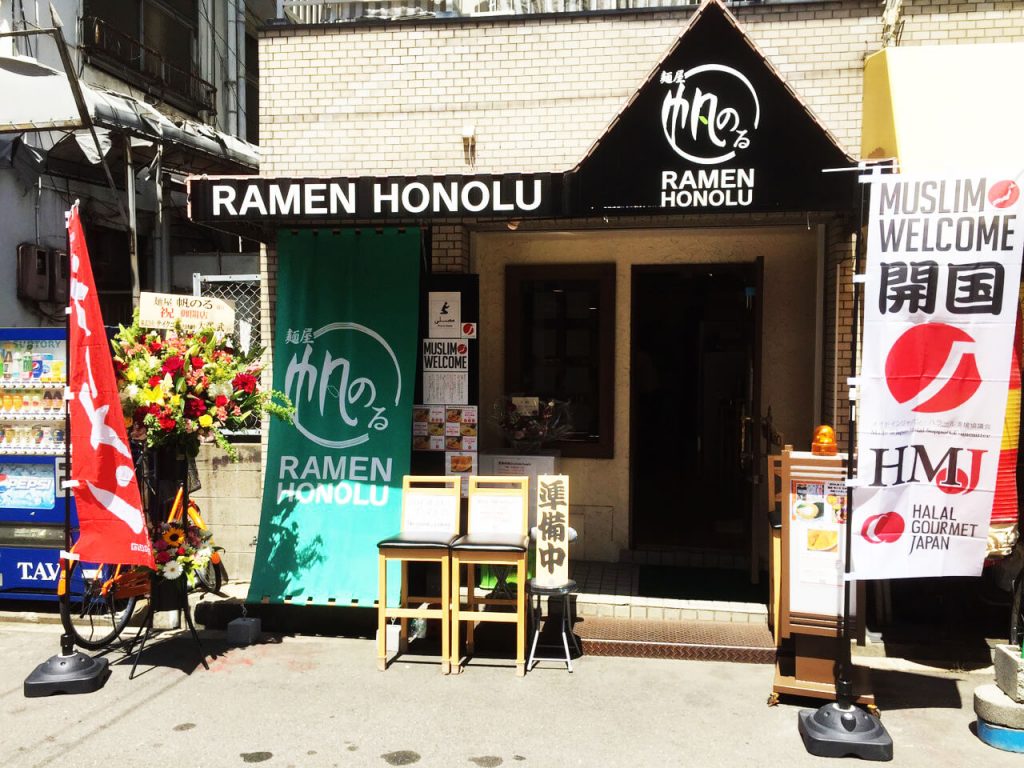
(Source: itsyourjapan.com)
I found Ramen Honolu after a short walk from Ebisu Station. The shop is small but busy, with the smell of rich chicken broth. I ordered the spicy chicken ramen. It came steaming hot, topped with slices of tender chicken, a soft-boiled egg, bamboo shoots, and spring onions. The broth was creamy and full of flavor without being too heavy. The noodles were chewy and cooked just right
📖 About Ramen Honolu
Ramen Honolu is one of the most popular halal ramen chains in Tokyo. All ingredients are halal-certified, and no alcohol or pork is used. The menu includes spicy and non-spicy ramen options, plus fried chicken and rice bowls.
📍 Location:
Ebisu 1-23-1, Shibuya-ku, Tokyo (5 mins from Ebisu Station)
🍴 What to Order:
Spicy Chicken Ramen, Fried Chicken, Karaage Rice – approx. ¥1,000–¥1,500 (Rp 100.000–150.000)
🕒 Reservation Tip:
No reservation needed – best to go during early lunch or after 8 PM to avoid crowds
👨👩👧👦 Persona Fit:
Great for solo travelers, families, and halal food seekers
4. Cold Soba & Calm Views at Sojibo, Odaiba
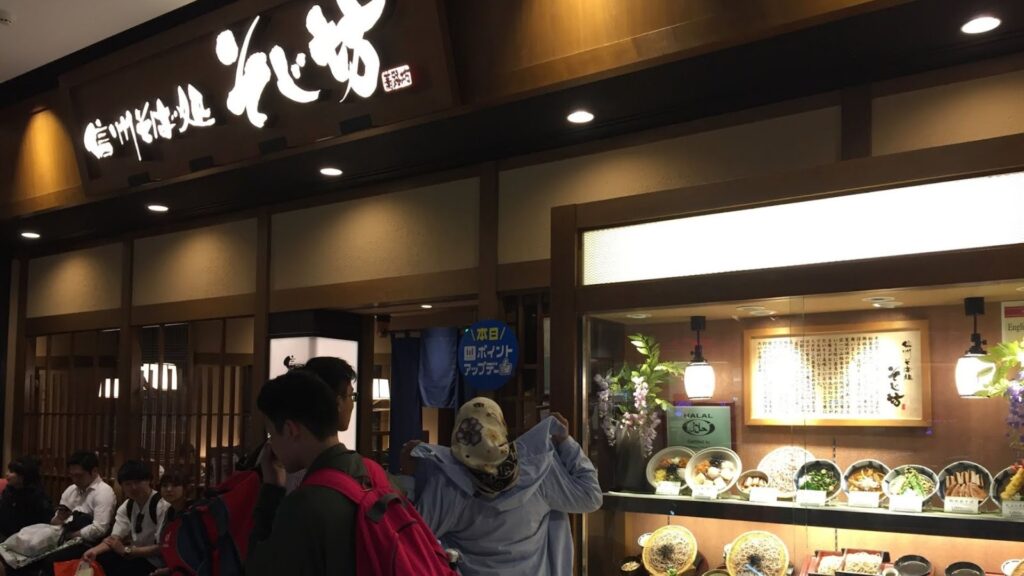
(Source: flipjapanguide.com)
I had lunch at Sojibo in Aqua City Odaiba. It’s a quiet restaurant with a nice view, and they clearly label the halal menu. I tried the cold soba with tempura. The noodles were soft and smooth, served with a dipping sauce. The tempura was crispy and fresh shrimp, sweet potato, and other vegetables. The meal was light, tasty, and filling. The staff were friendly and knew about halal requirements.
📖 About Sojibo
Sojibo is a Japanese soba chain. This branch in Odaiba offers halal-certified dishes—no pork or alcohol in the halal menu. It’s popular among Muslim travelers in Tokyo.
📍 Location:
Aqua City Odaiba 6F, 1-7-1 Daiba, Minato-ku, Tokyo (near Daiba Station)
🍴 What to Order:
Cold Soba with Tempura, Chicken Katsu Set
Approx. ¥1,000–¥1,500 (Rp 100.000–150.000)
🕒 Reservation Tip:
No booking needed. Go before 12 PM or after 2 PM for shorter wait times.
👨👩👧👦 Persona Fit:
Great for families, halal-eaters, and travelers looking for simple Japanese food.
5. Light Halal Fish Ramen at Menya Kaijin
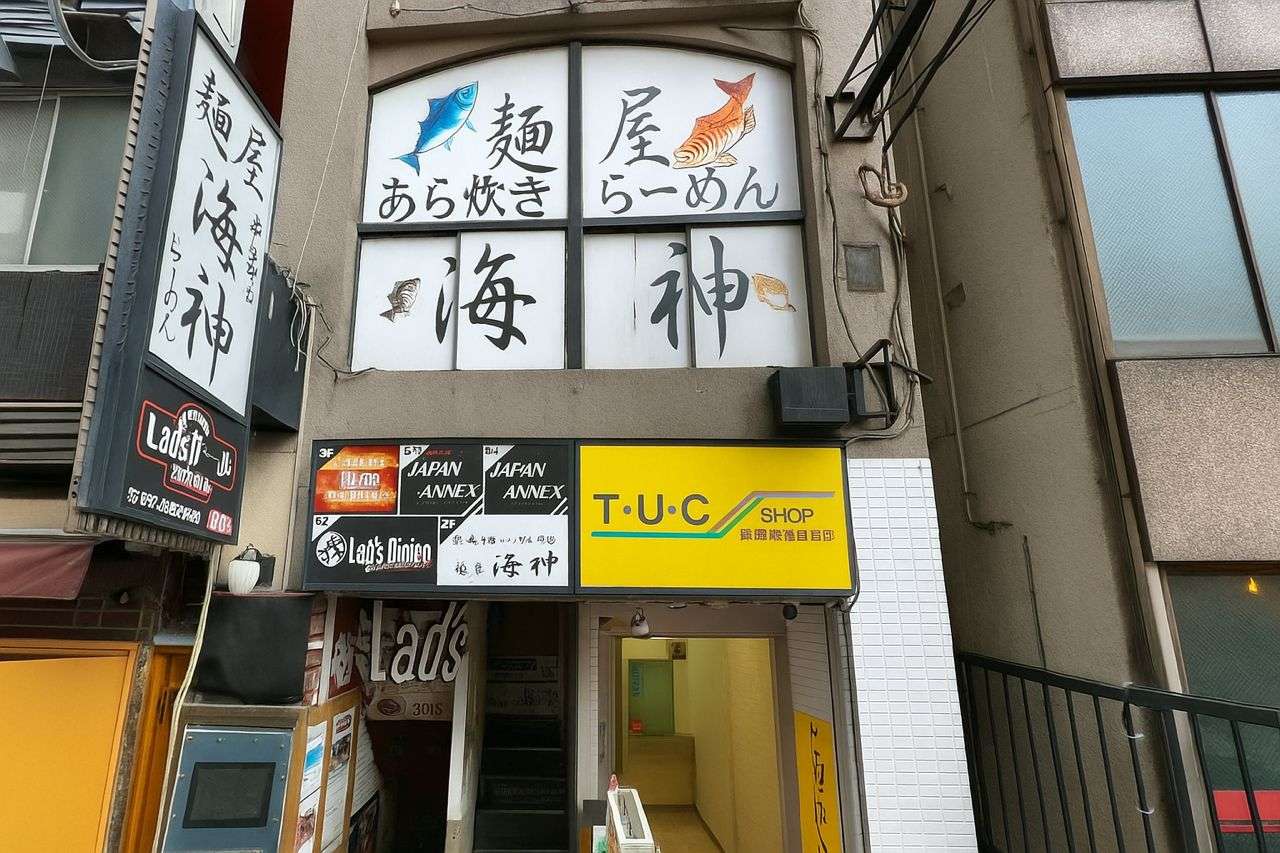
I stopped by Menya Kaijin near Shinjuku Station for lunch. It’s a small ramen shop known for its fish-based broth. I ordered the halal fish ramen—clear, light soup with a gentle seafood flavor, springy noodles, and a big piece of chicken meatball on top. It felt different from heavy tonkotsu ramen cleaner and easier to finish. They clearly understood halal needs and offered a separate halal menu.
📖 About Menya Kaijin
Menya Kaijin is a popular local ramen shop offering a unique twist—ramen made from fish broth instead of pork. While it’s not a fully halal restaurant, they serve a halal-certified version on request (limited daily).
📍 Location:
3-35-7 Shinjuku, Shinjuku-ku, Tokyo (2 mins from Shinjuku Station South Exit)
🍴 What to Order:
Halal Fish Ramen
Approx. ¥900–¥1,200 (Rp 90.000–120.000)
🕒 Reservation Tip:
No need to book. Go early—halal portions are limited each day.
👨👩👧👦 Persona Fit:
Great for solo travelers or anyone who wants a light, clean-tasting ramen
Halal Café, Bakery or Dessert Spot in Tokyo
1. Cream Puff Heaven at Chateraise Premium YATSUDOKI Ginza
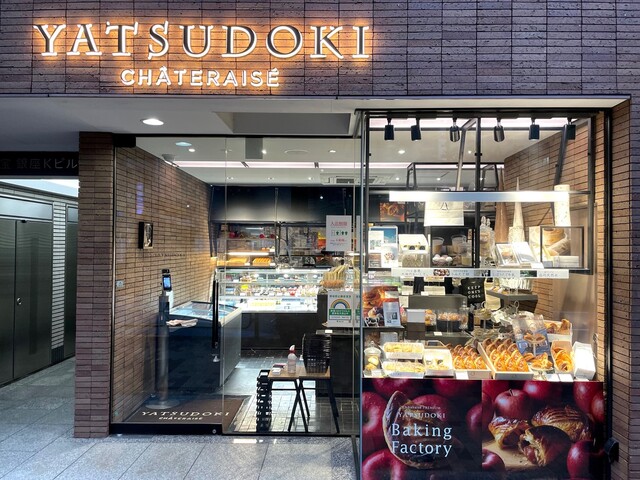
Walking into YATSUDOKI Ginza felt calm and elegant, soft lighting, neat shelves of pastries, and quiet background music. Locals were lining up for their famous cream puffs, and I knew I had to try one. The moment I bit into it, the crispy shell gave way to cold, rich custard cream, so satisfying without being too sweet. Paired it with their iced green tea. Perfect combo.
📖 About Chateraise YATSUDOKI
This premium outlet of the well-loved Chateraise chain offers desserts made with fresh Hokkaido cream and eggs. Most items here use gelatin-free and non-alcohol ingredients, making it one of the Muslim-friendly dessert shops in Tokyo. While not halal-certified, many sweets are suitable.
Location | Ginza (5 mins from Ginza Station) |
Opening Hour | Open daily, 10 AM – 8 PM (shorter hours on weekends). |
Cost | Around ¥300–¥600 per item (Rp 30.000–60.000) |
2. French-Japanese Bakes at Rose Bakery Ginza

(Source: lifestyle-ins.com)
I visited Rose Bakery at Dover Street Market Ginza. The space was quiet and clean, with simple wood décor and a calm crowd. I tried the carrot cake, which was soft and moist with a mild spice and creamy topping—not too sweet, just right with a cup of tea.
📖 About Rose Bakery
Rose Bakery is a café from Paris known for its healthy and fresh dishes. In Tokyo, it serves light meals, baked goods, and desserts. While not halal-certified, many options are vegetarian or alcohol-free, making it Muslim-friendly for a snack or light lunch.
Location | Ginza – Dover Street Market, 6th floor (near Ginza Station) |
Opening Hour | Open daily, 11 AM – 8 PM |
Cost | Around ¥700–¥1,200 (Rp 70.000–120.000) |
3. Creamy Milano Cheesecake at TEATRO eFfe Tokyo
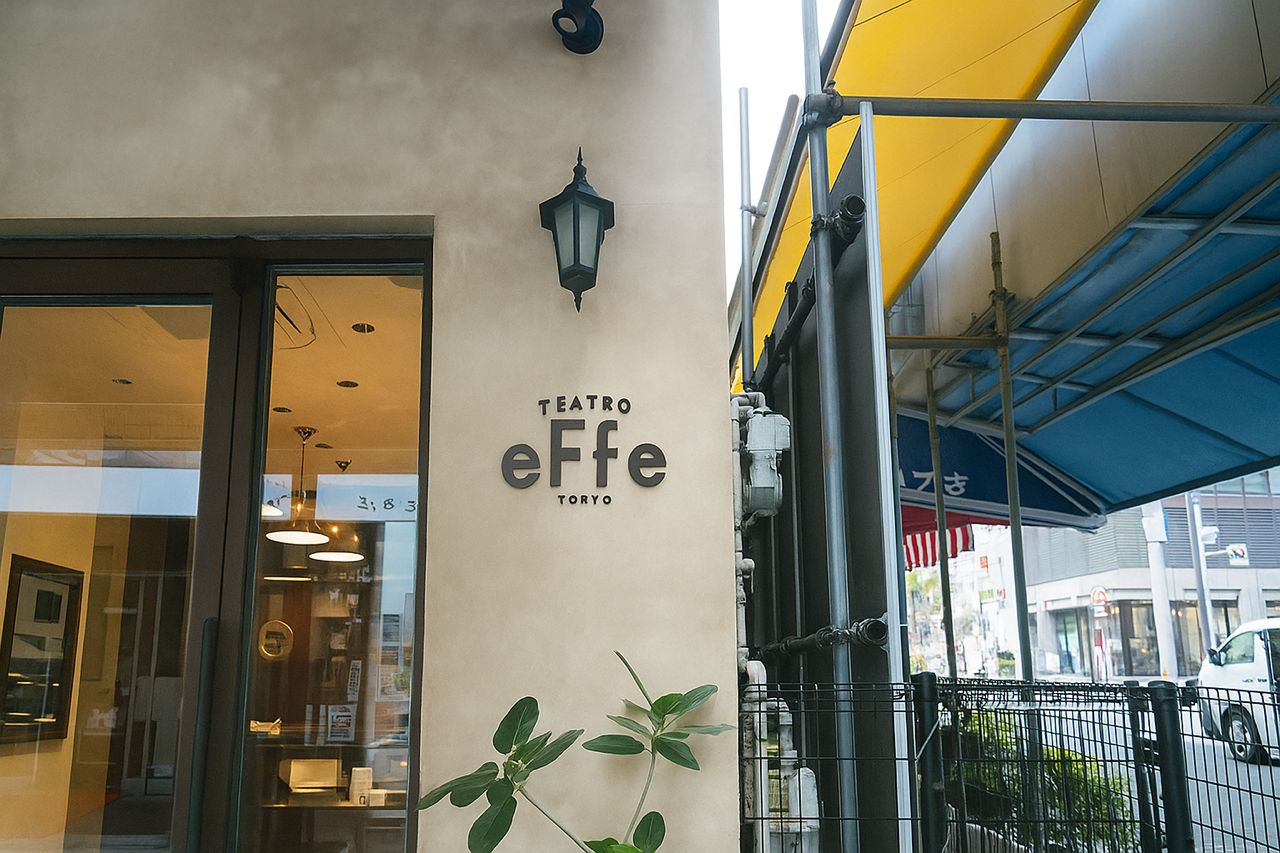
I stopped by TEATRO eFfe after browsing Tsukiji Outer Market. It’s a small café with just a few seats and a low hum of conversation. I tried their signature Milano Cheesecake—a firm, creamy slice made with Mascarpone, Parmigiano, and cream cheese. It had a slightly salty edge balanced by mild sweetness. Paired with their vanilla latte, it hit the spot without being overpowering.
📖 About TEATRO eFfe
This café opened in October 2022 near Tsukiji. It’s known for its Basque-style Milano Cheesecake made with three imported cheeses. No alcohol or pork, labeled “halal-friendly.” The shop is a cozy stop for market visitors.
Location | Tsukiji 4‑9‑1, Chūō-ku, Tokyo (3 min walk from Tsukiji Station) |
Opening Hour | Mon–Fri: 10 AM–6 PM • Sat–Sun & Holidays: 8 AM–3 PM |
Cost | ¥700 (Rp 70.000) per 8 cm slice |
Halal Local Snack and Food Souvenir
1. Irresistible Halal Rice Crackers – Tokyo Arare
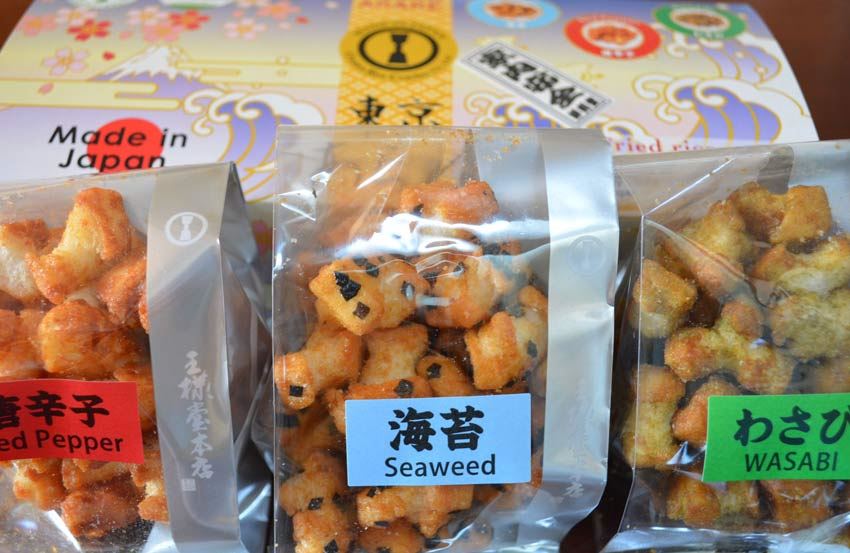
📝 The Find & the Flavor
I found these halal-certified rice crackers at Osama-do in Asakusa, just a short walk from the Kaminarimon Gate. They’re light, crunchy, and come in a mix of flavors—like soy sauce, seaweed, wasabi, and even matcha. The packaging is neat and simple, which makes it perfect for bringing home. It’s a quick, tasty snack that isn’t too sweet or greasy.
📖 About Tokyo Arare
Arare are traditional Japanese rice crackers, made from glutinous rice and usually eaten during festivals or as snacks. Osama-do’s version is halal-certified and uses only plant-based oils.
🛒 Where to buy: Osama-do Honten, 2-6-8 Senzoku, Taito-ku (Asakusa) or Tokyo airports
🎁 Travel-friendly? Yes — light, sealed, and won’t crumble easily.
👨👩👧👦 Persona Fit: Great for Muslim travelers or anyone looking for a safe, compact Japanese snack.
2. Halal Tokyo Banana from JR Tokyo Station

(Source: havehalalwilltravel.com)
I found the halal-certified Tokyo Banana at JR Tokyo Station inside the souvenir zone near Yaesu Exit. It’s a soft sponge cake filled with smooth banana custard, light, creamy, and not overly sweet. Each piece comes individually wrapped, which made it super convenient to toss into my bag for the trip home.
📖 About Tokyo Banana (Halal Version)
Tokyo Banana is one of Japan’s most popular souvenirs. While the original contains non-halal ingredients, the halal version is made with plant-based alternatives and is officially certified, perfect for Muslim travelers.
🛒 Where to buy: JR Tokyo Station (Gransta Tokyo, B1F near Yaesu Central Exit)
🎁 Travel-friendly? Yes — shelf-stable for a few days, individually packed, great for gifting.
👨👩👧👦 Persona Fit: Perfect for halal-conscious gift-givers, sweet snack lovers, or anyone needing a last-minute souvenir.
3. Soft & Chewy Kibi Dango from Tottori-Okayama Shimbashi-kan
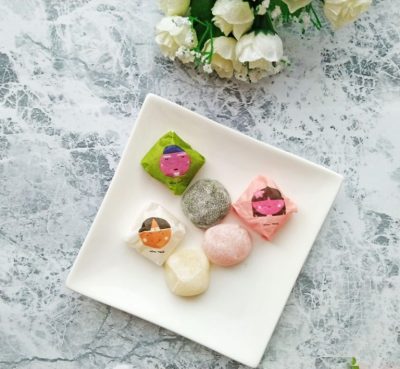
(Source: fooddiversity.today)
While browsing at Tottori-Okayama Shimbashi-kan in Shimbashi, I came across a box of kibi dango small, round mochi coated with kinako (roasted soybean flour). They looked simple, but the flavor was nostalgic and comforting. Soft, mildly sweet, and nutty from the kinako, they were light and easy to enjoy. The packaging is clean, cute, and travel-friendly—perfect for gifting or snacking on the plane.
📖 About Kibi Dango
Kibi dango is a traditional Japanese sweet from Okayama, often linked with the legend of Momotaro. It’s made with glutinous rice or millet flour and is a popular snack in western Japan.
🛒 Where to buy: Tottori-Okayama Shimbashi-kan, Shimbashi, Tokyo
🎁 Travel-friendly? Yes – boxed, lightweight, and doesn’t spoil easily.
👨👩👧👦 Persona Fit: Great for travelers wanting an easy, halal-safe souvenir with cultural value.
Halal Food Street and Dining Zone In Tokyo
1.Flavor of Asakusa’s Nakamise Street at Peak Hour
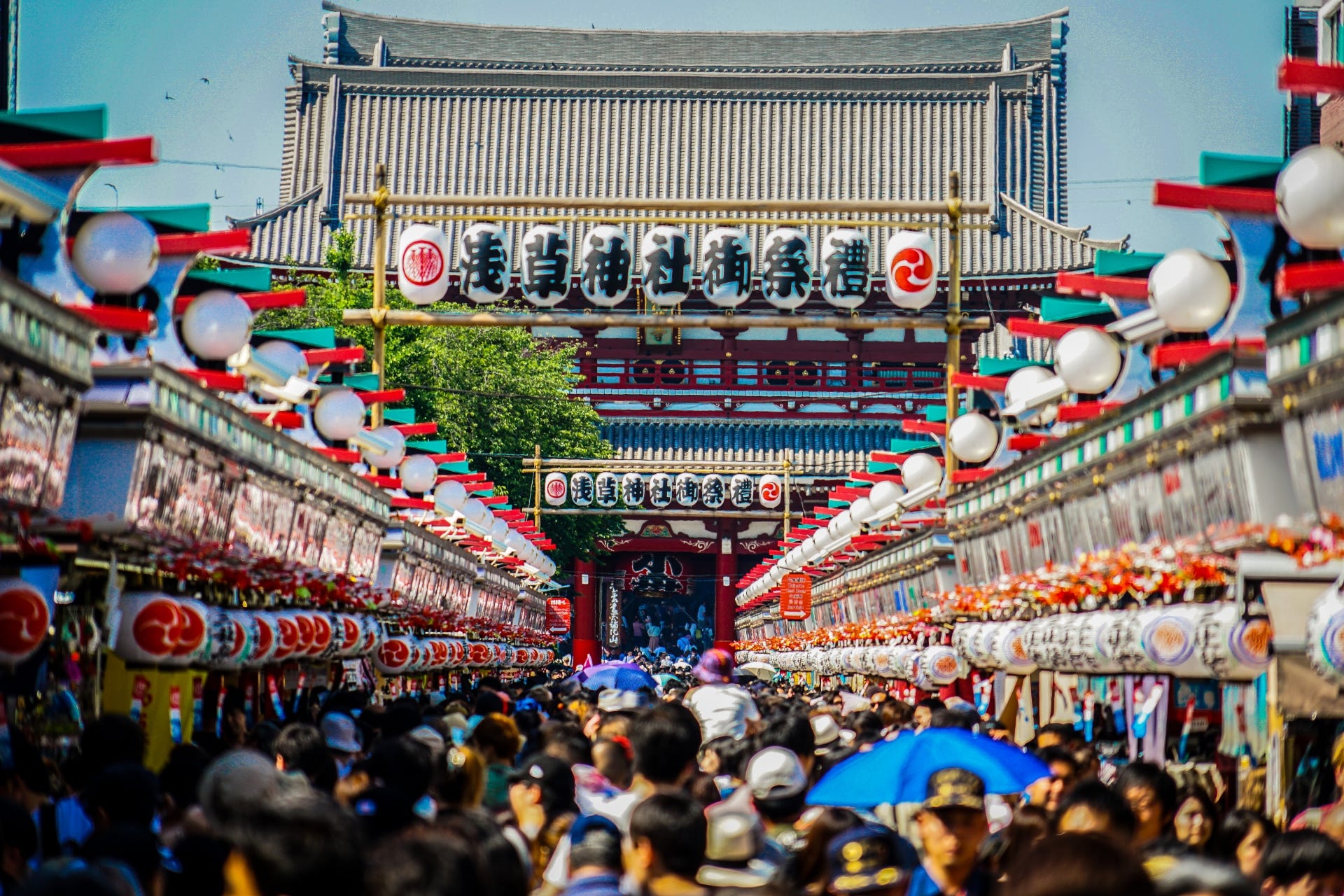
(Source: jw-webmagizine.com)
Nakamise Dori was packed when I arrived around noon. The air smelled of grilled soy sauce, sweet mochi, and roasted tea. I walked past rows of shops selling souvenirs and snacks, but what caught my eye was a takoyaki stand with a halal-certified sign. I ordered a small tray, the balls were hot, crispy on the outside, and soft inside, with chunks of octopus and a tangy sauce. Simple, tasty, and I didn’t have to worry about the ingredients. Everything felt easy and welcoming, even with the crowds.
📖 About Nakamise Street
Located in front of Senso-ji Temple in Asakusa, Nakamise Street is one of Tokyo’s oldest shopping streets. It’s known for traditional snacks and sweets. In recent years, a few vendors now offer Muslim-friendly or halal options, making it easier for halal travelers.
📅 Best time to visit: 11 AM–2 PM for full stall variety
Top Things To Eat | Takoyaki – Octopus balls with sweet-savory sauce Mitarashi Dango – Chewy rice balls with soy glaze Senbei – Grilled rice crackers Candied Fruits – Skewered fruits with sugar coating Sweet Potato Tempura – Light and crispy |
Location | Asakusa Station (Ginza or Asakusa Line), 2-min walk to Nakamise |
Cost | ¥500–¥1,500 (Rp 55.000–Rp 160.000) per person |
💡 Pro Tips:
💓 Check for halal signs or ask “Halal desu ka?”
💓 Bring cash—most stalls don’t take cards
💓 Try smaller portions from different stalls
2. Street Snacks at Takeshita Street, Harajuku
(Source: byfood.com)
Takeshita Street in Harajuku is always busy, full of young crowds and small shops. As I walked in, I noticed a few halal-friendly stalls between the clothing stores and dessert cafés. I grabbed a chicken karaage from a halal stand—it was hot, crispy, and tasty. Then I tried a crepe filled with banana and whipped cream. It was light, sweet, and easy to eat on the go.
📖 About Takeshita Street
This street is a popular shopping and snack spot near Harajuku Station. Some stalls offer halal options clearly marked, making it easy for Muslim travelers to enjoy street food.
📅 Best time to visit: 1–5 PM for the snack crowd
Top Things To Eat | Halal Chicken Karaage – Crispy and juicy Banana Cream Crepe – Sweet and light Matcha Soft Serve – Cold and refreshing Cheese Hot Dog – Crunchy with gooey cheese Rainbow Cotton Candy – Fun and colorful |
Location | 1-minute walk from Harajuku Station (JR Yamanote Line) |
Cost | Around ¥600–¥1,500 (Rp 65.000–Rp 160.000) per person |
💡 Pro Tips:
💓 Check for halal signs before buying
💓 Most stalls are takeaway only
💓 Weekdays are less crowded
3. Skewers & Sizzle at Ameyoko Street, Ueno

Ameyoko Street near Ueno Station was busy and loud, with lots of food smells in the air. I found a small halal stall selling chicken and beef yakitori—grilled meat on skewers, simple and tasty. I also tried halal takoyaki made with fish-based sauce. Everything was quick to grab and easy to eat while walking.
📖 About Ameyoko Street
Ameyoko is a popular shopping and street food area in Tokyo. Some stalls and restaurants now offer halal-friendly options, making it easier for Muslim travelers to enjoy local snacks.
📅 Best time to visit: 3–7 PM
Top Things To Eat | Yakitori – Grilled chicken or beef skewers Fish-based Takoyaki – Soft octopus balls with sauce Grilled Corn – Lightly seasoned and sweet Fruit Cups – Fresh and refreshing Matcha Mochi – Green tea-flavored rice cake |
Location | Ueno Station (JR or Tokyo Metro), 2-minute walk |
Cost | Around ¥700–¥1,500 (Rp 75.000–Rp 160.000) |
💡 Pro Tips:
💓 Some stalls are halal; look for signs or ask
💓 Cash is preferred
💓 Go earlier to skip the crowd
Explore Halal Food in Tokyo—Simple, Tasty & Easy
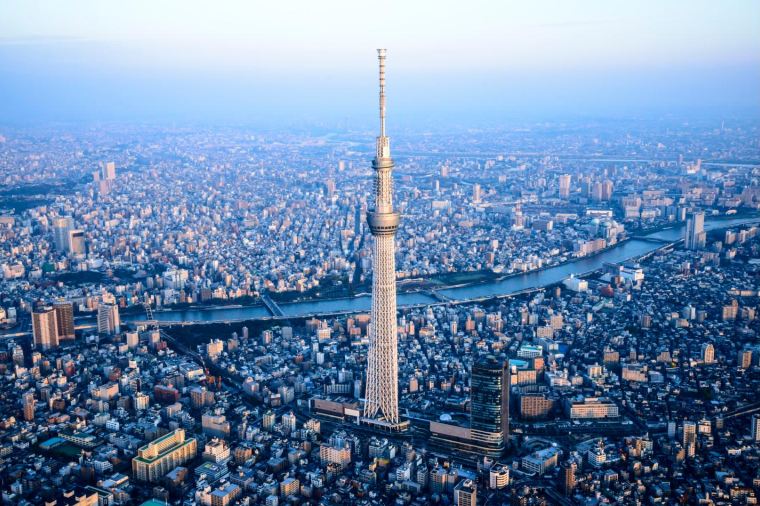
I was surprised by how easy it is to find halal food in Tokyo. From tasty halal ramen in Shinjuku to sushi in Asakusa, there are plenty of delicious options for Muslim travelers.
If you’re flying from Jakarta, Tokyo is just a flight away. Once you land, areas like Asakusa, Shibuya, and Shinjuku are great places to stay—they have many halal-friendly restaurants nearby. Some of my favorites include wagyu yakiniku at Gyumon, soba noodles at Sojibo Odaiba, and even halal desserts like Tokyo Banana and dango.
Need help planning? Trip.com makes it simple to book hotels, find halal restaurants, and explore fun tours for Muslim travelers.
✈️ Tip: Grab onigiri without meat from any convenience store—it’s cheap, filling, and perfect when you’re on the move.
FAQs: Halal Food in Tokyo
Is halal food easy to find in Tokyo?
Yes! Halal food is becoming more available, especially in areas like Asakusa, Shibuya, Shinjuku, and Ueno. Many restaurants are certified halal or offer halal options.Where can I find halal convenience food?
Look for onigiri (rice balls without meat), plain udon or soba, and some bento sets in 7-Eleven or FamilyMart. Always check ingredients or ask staff.Are there halal certifications in Japan?
Yes, many halal restaurants display certification by local halal authorities like Nippon Asia Halal Association (NAHA) or Japan Halal Foundation (JHF).Are there prayer spaces near halal restaurants?
Yes! Some restaurants like Gyumon or malls like Aqua City Odaiba offer prayer rooms. Major train stations (Tokyo, Ueno, Shinjuku) often have nearby mosques or musollas.Is Tokyo family-friendly for halal dining?
Absolutely! Many halal restaurants in Tokyo are family-friendly, with high chairs, space for strollers, and kids’ portions.How do I find halal restaurants easily?
Use apps like HappyCow, Google Maps (type “halal food Tokyo”), or check listings on Trip.com and Halal Navi.

 20845 booked
20845 booked

